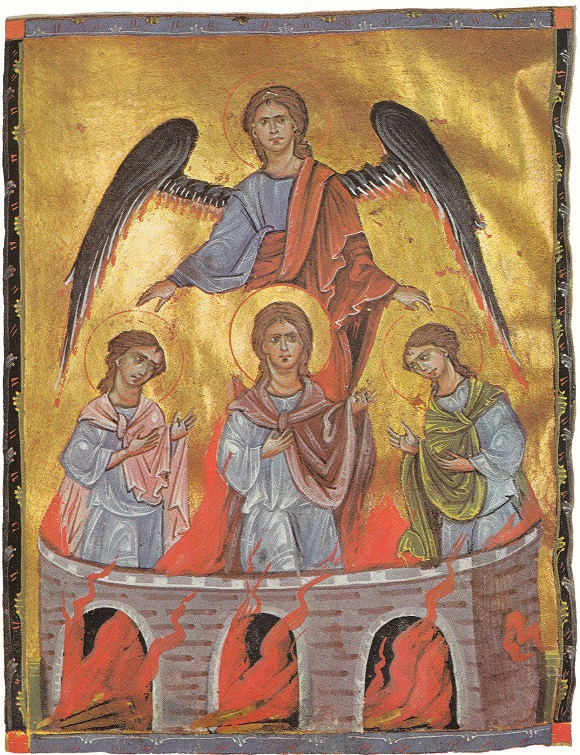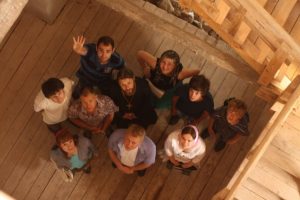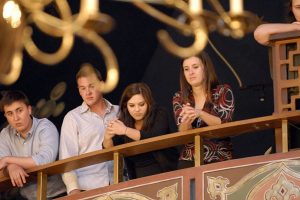Recently I ran across an article mulling over the reasons young adults leave the Church. It’s no secret that as a group we Orthodox haven’t done a very good job of keeping our children connected to our Faith. Indeed, attrition estimates among college aged adults range as high as 60%. The article offered a few sensible explanations as to why young people walk out the door of the Church when they walk through the gates of the university, but as I was reading another question, almost the opposite question, formed itself in my mind: why should they stay? What justification can we offer for asking someone to forego sleeping in on Sunday, giving up meat and dairy for about 6 months of the year, abstaining from the premarital sex their friends are enjoying, and all the other “no’s” that seem to crop up when you’re talking about being a Christian? Our young friends aren’t likely to find the answer, “to stay out of hell” or, “to go to heaven” very persuasive for the simple reason that heaven and hell seem very abstract, very far away, and the pleasures of life seem intensely close, tangible. If we are honest many of us would admit that those answers don’t motivate us either. So why should we ask them to stay? Perhaps we should ask ourselves the same question. Why do we bother with the trouble of being Orthodox Christians, accepting the effort and sacrifice that it requires, rather than just enjoying whatever makes us happy? In his work, On The Apostolic Preaching, St. Irenaeus of Lyon, reflecting on the fall of man, describes Adam and Eve as little children, biological and spiritual babies, in Paradise. As Irenaeus sees it, Adam and Eve were created immature but with the dynamic capacity to grow and become more and more like God, sharing increasingly in the brilliance of His holiness. St. Symeon the New Theologian says that the human spirit was created to be filled with God and that grace was meant to overflow into our very bodies, filling our whole being with the power and glory of God. But Adam and Eve were young and this capacity was not yet developed when they were tricked by the serpent and cast out of the garden. As a result their growth was stunted. Adam and Eve grew up biologically but their spirit withered outside of Paradise and they never became what mature humans are, the meeting point of the created world and the uncreated God, all full of glory. This was the fate of every person before Christ but through His death and resurrection Christ overturned our sad, unfulfilled lot and made it possible once again for us to come alive and share in the boundlessness of the Father’s eternal life. By washing away our sins in baptism, sealing us with the Holy Spirit in chrismation, and filling us with Himself in communion, Christ draws us up again into the life we are made to experience. This provides what I think is the most powerful answer to the question, “why bother with the trouble of being Orthodox?” We bother with fasting, confession, long services, and all the rest because we want to know what it’s like to be fully human. We want to experience the communion with our Creator that fills us with life. We want to enjoy the awake-ness, the intensity of being, that belongs to a creature wholly itself, shot through with the glory of God.
In his work, On The Apostolic Preaching, St. Irenaeus of Lyon, reflecting on the fall of man, describes Adam and Eve as little children, biological and spiritual babies, in Paradise. As Irenaeus sees it, Adam and Eve were created immature but with the dynamic capacity to grow and become more and more like God, sharing increasingly in the brilliance of His holiness. St. Symeon the New Theologian says that the human spirit was created to be filled with God and that grace was meant to overflow into our very bodies, filling our whole being with the power and glory of God. But Adam and Eve were young and this capacity was not yet developed when they were tricked by the serpent and cast out of the garden. As a result their growth was stunted. Adam and Eve grew up biologically but their spirit withered outside of Paradise and they never became what mature humans are, the meeting point of the created world and the uncreated God, all full of glory. This was the fate of every person before Christ but through His death and resurrection Christ overturned our sad, unfulfilled lot and made it possible once again for us to come alive and share in the boundlessness of the Father’s eternal life. By washing away our sins in baptism, sealing us with the Holy Spirit in chrismation, and filling us with Himself in communion, Christ draws us up again into the life we are made to experience. This provides what I think is the most powerful answer to the question, “why bother with the trouble of being Orthodox?” We bother with fasting, confession, long services, and all the rest because we want to know what it’s like to be fully human. We want to experience the communion with our Creator that fills us with life. We want to enjoy the awake-ness, the intensity of being, that belongs to a creature wholly itself, shot through with the glory of God.
Young people, perhaps all people, need a purpose in life that is worthy of their effort, worthy of their sacrifice and this is it. If you want to know what it’s like to be fully awake and alive in this life, be a Christian. If you want to experience the fullness of the glory of God that humans are made to experience, put God first in your life and pursue him hard. Don’t settle for a merely biological life that will not last. Reach out for a share of God’s divine life that will not end. Through the disciplines of the Church, we can be, if we are willing, transfigured by the grace of the Holy Spirit into fully human persons capable of experiencing God’s brightness and sharing it with a darkened world. When we reach for that grace, we become more and more alive, more our true selves, more capable of bringing healing to the world around us. Fasting, confession, communion, and all the rest are the road to awe; they make us fully alive and restore us to our calling as stewards of all creation. That is a goal worthy of our sacrifice, and it is what makes all of the trouble worth it.
Fr. John Cox is a 2011 graduate of St. Vladimir’s Seminary. Following graduation Fr. John and his family were assigned to Dormition of the Theotokos Orthodox Church (OCA, Diocese of the South) in Norfolk, Virginia.
















